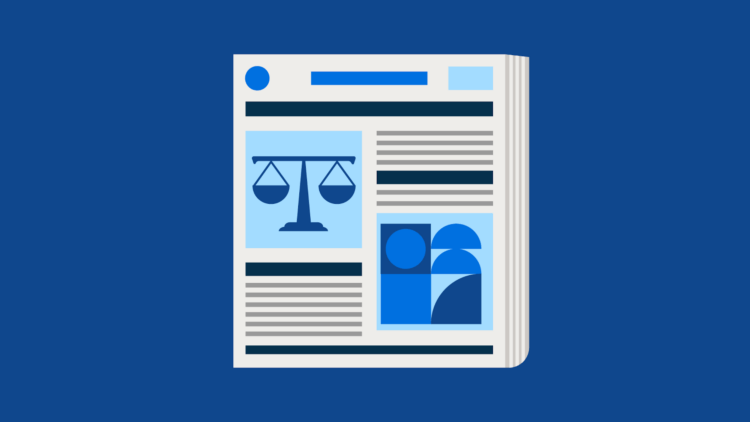When you’re wrong, you’re wrong. As we compiled the first edition of our law firm technology roundup, we noticed that, while the respondents were all whip-smart and extremely insightful, they tended to skew a little … male. But with women laying claim to a progressively larger percentage of the legal workforce (36 percent in 2016, compared to 28 percent in 2000), and with women set to outnumber men in law school enrollment for the first time, we wanted to ensure that we had appropriate representation in our post.
So we sent out the call to some of the most prominent women in our community to see what impacted them most in 2016—and where they think the legal profession is headed this year.
Our commentators include:
- Sara Kubik, Ph.D., a recent law school graduate with a doctorate in Technology and an MBA in Marketing
- Sarah Glassmeyer, Project Manager Specialist at the ABA Center for Innovation and former Research Fellow at the Harvard Library Innovation Lab
- Janet Welch, Executive Director of the State Bar of Michigan
- Jayne Reardon, Executive Director of the Illinois Supreme Court Commission on Professionalism
As with our original post, a few broad themes emerged: the dominance of artificial intelligence (A.I.) in legal news last year, blockchain and big data poised to have a big impact in 2017, and the necessity of secure communication channels made an appearance in multiple respondents’ answers.
Dig into the responses below:
Clio: What was the biggest news in legal technology in 2016?
Sarah: I’m going to go against the trend and NOT say ROSS and artificial intelligence. They may have received the most press, but as for importance in the long run … all they’re doing right now is making legal research more efficient. It’s not going to replace lawyers, but it may make some librarians and other knowledge professionals obsolete.
I’m going to go out on a limb and say that the lawsuits in Georgia (between Carl Malamud and the State of Georgia over copyright of the state code and between Fastcase and Casemaker over licensing rights of Administrative Codes) have the potential to have a huge impact on the raw material of legal tech, which is law. Once law becomes truly open and free, companies like ROSS, Ravel, and Casetext are gonna be thick on the ground. I can’t wait!
Editor’s note: The lawsuit between Fastcase and Casemaker was dismissed on January 26, 2017, after these answers were received. According to a post from Bob Ambrogi, Ed Walters, CEO of Fastcase, indicated he still sees the ruling as a partial victory. Fastcase has since refiled the suit.
Janet: Tempting as it is to pick out one shiny new product, I think what is most newsworthy is the stunning growth of new applications, new commentators, and a growing acceptance among rank-and-file lawyers that tech in legal work is here to stay.
Jayne: Legal technology competency finding its foothold in over half of the states’ rules. Comment 8 to Model Rule of Professional Conduct 1.1 provides that being competent means staying abreast in changes in the practice of law, including the benefits and risks of relevant technology. The Supreme Courts in half of the states have now adopted this provision in their state’s rule.
This acceptance by the high courts underscores the importance of embracing technology in the practice of law and demands the same from those lagging behind or, frankly, resisting change.
Sara: The impact of A.I. But here’s the thing: A.I. is now a marketing term because there are so many different definitions.
Clio: What was the biggest surprise for you this year?
Sara: That [prominent law blog] Above the Law turned off their comments section. Given the level of snark and hazing and overall nastiness, I’m glad they turned it off—however, sometimes there is a lot that can be learned from the commenters.
Take, for example, arstechnica.com. This is a technology-based website and the commenters are tech-heads. They can be snarky, but the insight they have is very valuable. Lawyers have insight as well, but Above the Law’s commenters were just plain mean.
Sarah: That LexisNexis bought [legal analytics startup] Lex Machina. That was pretty smart and forward-thinking. It also showed that big (legal) data is coming into the big leagues.
But really, the biggest surprise is that there weren’t any huge surprises. I remain bullish on legal tech and the idea that there are many untapped areas ripe for innovation.
Janet: The legal implications of blockchain.
Jayne: A pleasant surprise was to see how much attention and assistance the Access to Justice movement has received due to technological advancements. As demand increases and funding struggles, the leaders guiding the support and delivery of legal services to the underserved have recognized that technology can not only help their cause, it can be a game changer in terms of efficiency and outreach.
An example is the updated Illinois Legal Aid Online (ILAO) web portal. It serves hundreds of thousands of customers seeking legal answers who normally may not be able to afford a lawyer, with more than half of them finding ILAO using their phone.
You may like these posts
Clio: What do you think will be the most important trends in the legal sphere in 2017?
Sara: A realistic trend is getting e-filings systems implemented across all states. It would be amazing and important if they could standardize these systems so lawyers practicing in multiple jurisdictions could benefit.
Sarah: I think 2017 is blockchain technology’s year. Self-executing or “smart” contracts are just the beginning. You can build all sorts of apps on top of the blockchain, and it’s much more secure than existing technologies, which is what is desperately needed in the legal sphere. I also think we’ll see more with “big” data applications and hopefully people will get smarter about privacy.
This is wishful thinking on my part, but I hope the open source culture will also take hold in legal tech.
Don’t go looking for answers in the tech marketplace until you’ve asked the right questions.
Janet: 1) I would like to see cybersecurity become a more prominent part of mainstream legal practice thinking. 2) If the speculation is true and federal spending for the Legal Services Corporation is zeroed out or even hollowed substantially in the U.S., that action will cause a destructive tsunami to begin rippling through the U.S. civil justice system. 3) It’s always worth watching where legal services regulation in the U.K. is going, as well as the ongoing effort to apply A.I. in the court system and to move disputes online.
Jayne: Just like in most industries, how we communicate must drive how we deliver our services. Two undeniable trends are disrupting the legal profession, but at a pace that might not always be so obvious: the massive influx of a new generation of lawyers entering and composing much of the legal community, and the impact of technology on how that group communicates with clients and each other.
As both trends continue in 2017 at exponential rates, expect processes to be reexamined and new innovations to be centered around how we serve our clients, especially when the clients themselves are coming from a new generation as well.
Clio: What about the most important trends in technology in 2017?
Sara: Collaboration and partnerships across different industries. In the tech world and at the recent Consumer Electronics Show, we saw an explosion of Internet of Things (IoT) devices and driverless cars. These are not simple products! By their very nature, there has to be collaboration on a very large scale in order to accomplish these rollouts.
This high collaboration concept has been echoed (Get it? Echo-ed?) in the legal sphere … we need to partner with “non-lawyers.” If tech can do it—and they are coming up with driverless vehicles—legal can do it to come up with incredible solutions as well.
Sarah: What originally drew me to technology 15 years ago was the change brought about with Web 2.0—how it democratized the platforms and made everyone able to be a content creator. That was an amazing change, and it killed or deeply wounded many of our existing information ecosystem institutions.
As we saw in the presidential election in the United States in 2016, having gatekeepers on the spread of information was maybe kind of important? So I see a continued national conversation about roles and responsibilities in a world where everyone has equal voice and the President of the United States is probably going to start a war with a tweet.
Speaking of the new administration, I also think privacy will also be at the forefront of many people’s minds as they engage in electronic communication of all types.
Janet: Whatever smart, practical applications turn out to be most scalable for the middle class and low income folks needing legal services. I hope bar associations, with their deep understanding of what constitutes quality in legal services, deliver those applications. (And of course I hope that the State Bar of Michigan is a significant contributor.)
Jayne: Artificial intelligence isn’t just about the future anymore. It’s about the present, too. Headlines like ‘robot lawyers taking your jobs’ might make for good clickbait, but you don’t have to dig too deep to realize that A.I. is not going away. It will only increase in influence.
Just like most technological advancements, A.I. started at the fringes (of legal support) and has progressed to transforming legal processes. In 2017, we will continue to improve our work product and efficiencies, resulting in better client service.
More significantly, in 2017 A.I. will penetrate the core of legal reasoning that many lawyers consider sacrosanct through big data and expert systems.
Clio: Which new legal tech services and products are you most excited about for this year?
Sarah: I’m lucky because I got this questionnaire AFTER the reveal of the Legal Keyboard. Who would have thought that a keyboard with a section symbol and some other enhancements would make lawyers lose their minds? I’ve not played with a legal keyboard, so I can’t say I’m excited by it, but I am now hyped up on the idea of hardware hacks and what might be available that no one has thought of yet. That’s what makes innovation fun—the next big thing can be something simple but very effective if it makes lawyers’ lives easier.
As always, I’m also very excited by the possibilities of open software, open content and, yes, even open hardware. You think legal tech companies are scum or trying to *gasp* profit off the noble world of legal service delivery? Fine. Let’s take control of it as a community. Bake the rules and responsibilities of lawyers right into the creation. Take profit off the table as a motivating factor—I’d be down with that.
Janet: My passion is for bar associations to become the go-to, safe, and convenient place for the public to find appropriate, quality legal services, including simple, straightforward, and trustworthy guidance about whether and why to hire a lawyer and how to be a confident consumer of legal services.
The tech [in legal] already exists and is becoming increasingly sophisticated. It just needs to be embraced by the bar association world, customized, and continuously improved, jurisdiction to jurisdiction. I would love to see this happen collaboratively throughout the bar association world because I think that will result in the best, most resilient service.
Jayne: I’m anxious to see where A.I. takes legal research in 2017. As the guesswork is removed from finding applicable case law by using natural language searching and better results filtering, how will this convert into the legal writing component of attorneys’ work? How far are we from A.I. being able to draft a reply brief that is more accurate, authoritative, and comprehensive than a seasoned lawyer could muster? And being able to do so in a matter of seconds? And at what point will the public be able to implement the same technology, regardless of a legal education?
Clio: What’s the number one product, service, or app that savvy lawyers NEED to have going into 2017?
Sara: I am all about mobile access first. Adobe Fill & Sign DC is a free mobile app that lets you create text fields in PDFs on your phone (even if there are no fillable fields) AND digitally sign PDFs with your finger. It is free. It can be clumsy, but when you are not near a computer or printer, it works.
The key is for every lawyer to do a deep-dive analysis of their own particular practice and the strengths and weak spots in their own delivery system.
Sarah: An InfoSec plan. If you’re not encrypting your communications with your clients—ALL YOUR COMMUNICATIONS WITH YOUR CLIENTS—you need to start ASAP.
Janet: I think there are just too many differences in the various needs of different types of legal practices for there to be one answer. I’m a big fan of services like Clio that aggregate and allow mix and match. The key is for every lawyer to do a deep-dive analysis of their own particular practice and the strengths and weak spots in their own delivery system. Don’t go looking for answers in the tech marketplace until you’ve asked the right questions.
Jayne: Email. Sounds too simple, right? You’d be surprised how many attorneys do not rely on email communications or are even completely unplugged from technology. In 2016, Illinois made it mandatory for attorneys to accept email service and include email addresses on court filings. So, it’s time to have your email address handy and manage it efficiently.
Clio: What represents the biggest opportunity for solo and small firm attorneys in the next year? What represents the biggest THREAT?
Sara: Use of a digital platform to connect with future clients. It takes work, but clients young and old are online. So, a solo and small firm can develop content marketing and an online brand by working with professionals. But you should avoid posting boring and useless material online because it becomes noise. Spam.
Lawyers have some of the strongest personalities out there! Make that heard on your tweets, blog, and website. It will separate you from the herds of firms who are probably posting pictures of themselves standing in front of a law library.
Solos and small firms can build up a trust-type of connection with prospective clients, and this is how to thrive on social media and other communication channels right now.
If a solo or small firm practitioner is not leveraging technology, they are probably working too hard for too little.
Sarah: I can guarantee you can become more efficient in your practice and, as a result, be more profitable and serve more clients. Whether by going through a process audit or changing the tools that you use, whatever it is, you’re not working at peak performance right now. There are always ways to improve and that should make you excited.
The biggest threat will remain that most people don’t realize that they need an attorney’s services, that their issue may have a legal solution, and/or that using the services of an attorney may not be the only solution, but can either expedite or improve the solution.
Janet: The biggest opportunity? What big data can tell [lawyers] about the latent market and how to reach it. The biggest threat? Complacency.
Jayne: Practice management tools offer a huge opportunity for solo and small firm practitioners to manage their client communications, case progress, projects, and billing. Technology also may be leveraged to obtain clients in the first place. If a solo or small firm practitioner is not leveraging technology, they are probably working too hard for too little. This leads me naturally to the biggest threat: Putting off until tomorrow what lawyers can start doing today to make their practices better, thus making more time to make their lives better.
Two out of four experts agree: Practice management software can improve your law firm in 2017. Don’t believe them? Try Clio for free—no strings attached.
Clio: If a lawyer only makes one change in their life this year, what should it be?
Sara: Hire professionals to do your marketing and design work. Pay them their going rate, which is probably more than you think it should be. Great designs look easy to create; they are not.
Sarah: Find one thing every day to be grateful for.
Janet: Unplug for a day and spend that time thinking about what could be different.
Jayne: Examine your work day to understand exactly how you are spending your time. It sounds silly, but many of us are practicing law the way we always have without realizing how many tasks are time-consuming but not income-generating. The first step to leveraging technology is to understand your current processes. Only after a personal assessment provides a lawyer that understanding, can they begin to seek out technology alternatives, allowing them to practice at the top of their licenses.
We published this blog post in February 2017. Last updated: .
Categorized in: Technology









